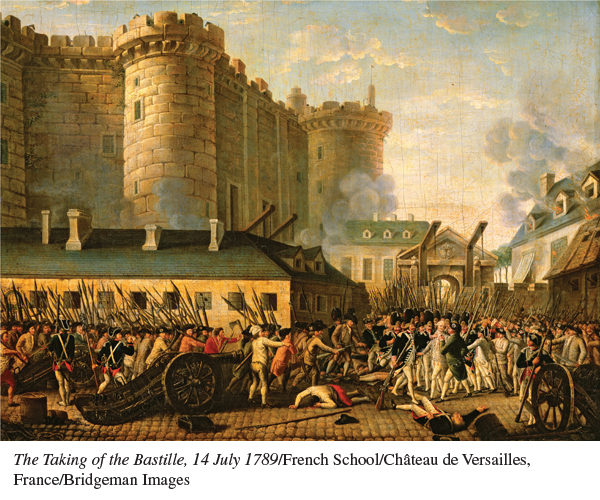A History of Western Society: Printed Page 610
A History of Western Society, Value Edition: Printed Page 585
A History of Western Society, Concise Edition: Printed Page 609
Introduction for Chapter 19
19
Revolutions in Politics
1775–1815
A great wave of revolution rocked both sides of the Atlantic Ocean in the last decades of the eighteenth century. As trade goods, individuals, and ideas circulated in ever-
The revolutionary era began in North America in 1775, and the United States of America won freedom from Britain in 1783. Then in 1789, France, the most populous country in western Europe and a center of culture and intellectual life, became the leading revolutionary nation. It established first a constitutional monarchy, then a radical republic, and finally a new empire under Napoleon that would last until 1815. During this period of constant domestic turmoil, French armies brought revolution to much of Europe. Inspired both by the ideals of the Revolution on the continent and by their own experiences and desires, the slaves of Saint-

CHAPTER PREVIEW
What were the factors leading to the revolutions of the late eighteenth century?
Why and how did American colonists forge a new, independent nation?
How did the events of 1789 result in a constitutional monarchy in France, and what were the consequences?
Why and how did the French Revolution take a radical turn entailing terror at home and war with European powers?
How did Napoleon Bonaparte assume control of France and much of Europe, and what factors led to his downfall?
How did slave revolt on colonial Saint-
Chronology
| 1775–1783 | American Revolution |
| 1786–1789 | Height of French monarchy’s financial crisis |
| 1789 | Ratification of U.S. Constitution; storming of the Bastille; feudalism abolished in France |
| 1789–1799 | French Revolution |
| 1790 | Burke publishes Reflections on the Revolution in France |
| 1791 | Slave insurrection in Saint- |
| 1792 | Wollstonecraft publishes A Vindication of the Rights of Woman |
| 1793 | Execution of Louis XVI |
| 1793–1794 | Robespierre’s Reign of Terror |
| 1794 | Robespierre deposed and executed; France abolishes slavery in all territories |
| 1794–1799 | Thermidorian reaction |
| 1799–1815 | Napoleonic era |
| 1804 | Haitian republic declares independence |
| 1812 | Napoleon invades Russia |
| 1814–1815 | Napoleon defeated and exiled |